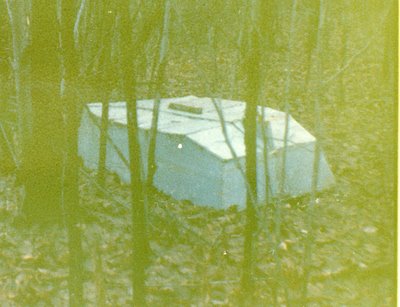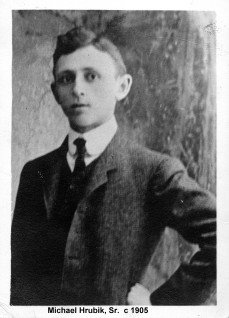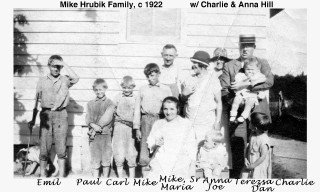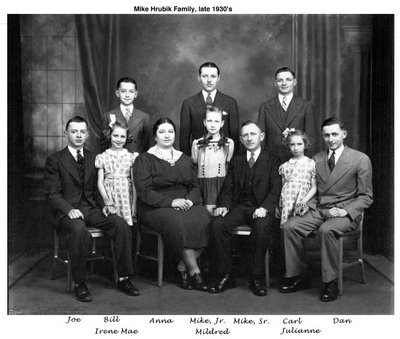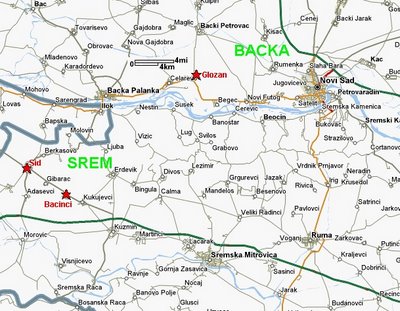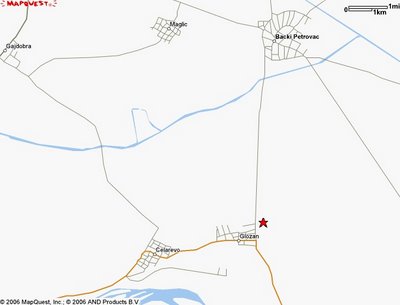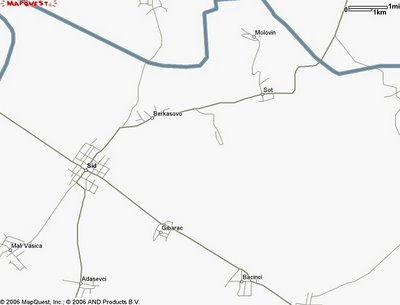Today (September 19) was Grannie Annie's birthday. GREAT Grannie Annie. As part of my Cabbage Leaf Tour, I sat down with her for about an hour and a half and recorded her telling the story of her life.
The little town of Glozan is but a fly-speck on the map of Serbia (Loyal Oak is a bigger crossroads), but it has produced some fantastic people. If you recall from Part One of this tale, it was the stating gate for Hrubik Mihaly. In 1895, when Mihaly was off in Budapest as a tailor's apprentice, the Cipkar family of Glozan had its third little boy, Jano. Two years later, in the same little speck on the map, the Pagac family saw the birth of Katarina. Just before the start of World War I, Cipkar Jano and Pagac Katarina married. As was the custom, the two set up housekeeping in the Cipkar holding. Neither could see the dark days ahead : in 1914, the Austrian Archduke Ferdinand was assassinated and shortly thereafter, Jano was conscripted into the Hungarian cavalry and sent off to the Russian Front.
A few months after Jano left for the war, Kata gave birth to a little boy. Jano would never see his firstborn son; the little fellow became sick one day and quickly died. The news also arrived from the front : Jano had been captured by the Russians and his fate was unknown. Kata was urged by her friends to return to her parents' home and get on with her life. Who knew if Jano would ever return? Those were the days of cruel barbarity at the front, and the time of the Great Flu Pandemic.
Kata refused to leave the Cipkar household, and began to attend church with her in-laws, who were Nazarenes. God touched her heart and converted her, and she joined their congregation. The war ended, but Jano was still unaccounted for. One day the electrifying news swept through Glozan : Cipkar Jano was alive, and was coming home!
Jano and Kata had a little girl, Susanna, and then little Jano. After that, they moved to Bacinci, about 3 miles SE of Sid, where Jano had a flour mill. There Annie was born on September 19, 1924, and then Mary on December 6, 1926. The flour mill was old and continually in need of replacement parts, and Jano was easily persuaded to sell the mill and return to the Cipkar homestead in Glozan, where his father provided a spot to build a new home. Jano went into debt for doors and windows for the new home, and with the European economy depressed, decided to go to Canada to earn enough to pay the debt. The catch was, that in order to go to Canada, he had to borrow still more money. Leaving in the Spring of 1928, he missed the birth of his fourth daughter, little Kata, that Fall. Once again he would be gone from his family for four years, returning from the Peace River Country in 1932 with little to show for his efforts except the money he sent back to Kata from time to time.
Meanwhile, Kata had been busy. Buying a cow, she sold the milk and butter, paying off Jano's debts. Jano returned to Glozan in 1932. Another baby was born and died, and then Sam was born in 1933. Jano had a few acres of land in Glozan, but it was not enough, so he went to Banat and tried farming there with little Jano. They lived in a little mud hut on the marshy plains, and there little Jano contracted malaria.
During this time, Jano frequently visited the Canadian Consulate in Novi Sad. The Canadians were refusing to allow immigration -- the Depression had hit North America. Jano made plans to move to Argentina, since Canada seemed closed. The papers were ready when some friends returned from Argentina with tales of life there : when the husband went to town, the wife hid in the fields from the bandits that plagued the countryside. Upon hearing this, Kata put down her foot -- she would not go to Argentina!
Then, one day the Canadian Consul told Jano that he could take his family to Canada, but they would need to have $1000 in addition to their tickets. They sold everything they had; house, rags, everything. Fearing that they would not have enough money, they went to some friends in Glozan to try to borrow additional funds, but were not able. It didn't matter, though, as the sale of their property brought more than the needed amount.
May 5, 1935, was the date for elections in Yugoslavia. Jano was warned by the Consul that he should be out of the country prior to that date, since a change in the government could cause difficulties for people trying to leave. From Glozan they travelled through Austria to France, sailing to Montreal and taking the train to Windsor.
John Cipkar got a job in Ruthven, where the family lived in an old run-down house for the summer. Kata worked for a family across the street, earning $2 a day, or sometimes milk, eggs, or chickens in trade. John and young Susie worked for a farmer for 90 cents a day each. In the Fall, the whole family worked at picking tomatoes on the farm across the street. In November of 1935, John bought the house in Harrow where Uncle John and Aunt Mary Miklovic would eventually live.
Annie went to school, attending kindergarten at the age of 11 to learn English. She remembered getting her clothes from the Salvation Army store, and having a coat with a big silver fox collar. On the way home from school, the kids would bring fresh baked bread -- 5 cents a loaf. John and Katie had a final daughter, Helen, in June of 1936.
In 1937, John's brothers Steve and George arrived in Harrow from Glozan. The Cipkars also had another set of visitors. The people from whom they had wanted to borrow money to come to Canada arrived. They had money, but had spent it all on a farm, cars, horses, and cattle, but had nothing left to live on. John went to the smokehouse and brought out sausage and laid out a feast. The man broke down and cried, "You wanted a few dollars and I wouldn't give it to you, and here you are feeding me."
During these years and through the Second World War, life was good. The ground produced, and there was plenty of food even if money was scarce. The Cipkars were constantly entertaining visitors. Mike and Anna Hrubik, from Akron, would sometimes visit, and their daughters, Mildred, Irene, and Julianne, spent some time on the farm. Once, when asked about the Hrubik boys, Anna Hrubik told Katie Cipkar that her boys were too old for Katie's girls.
Then, one day after the end of the War, in January 1946, Mike Hrubik travelled to Windsor, and his son Carl was his driver. Carl and Mike Jr. spent the night at Cipkar's. Anna Hrubik's sister, Irene Trpka, was in the group, and Carl and Mike Jr. took Irene, and Annie and Mary, to visit Andy Strba, who was distantly related to Trpkas. After church, when everyone was saying goodbye, Annie's sister Katie told Carl that he needed to kiss Annie goodbye, and he did. About six weeks later, Carl wrote a thank-you letter for the hospitality, and asked if he could visit again.
Carl started writing letters and visiting. One time he brought his album of Navy photos, with the Hawaiian hula girl pictures. In late June, Carl mentioned to the fellows at Galat Packing Company, where he worked, that he was going to marry a girl from Harrow. Ernie and Ted Pavkov said that they were going that way, and would check out this wife-to-be. Carl, realizing a potentially bad situation developing, rushed to Harrow that July 4th weekend and asked Annie to marry him. She said that was fine with her, but he needed to ask her Dad. John Cipkar had no objections, but told Carl that they could not marry until after the crops were in, and that he was not to send Annie back after they were married.
Carl would later tell of his visits through that summer and fall, waiting at the end of the field while Annie worked with the horses. He had a new car on order, but had to borrow a car to visit Annie because there was a long waiting list for cars. In September, at the urging of Sandor Pavkov, Carl bribed the car salesman with a whole pork loin, and got his car. On October 19, 1946, Carl and Annie Hrubik were married in a civil ceremony in Windsor. They had a honeymoon in Niagara Falls, and settled down in Akron in an attic room of a house on Ido Avenue.
Annie found it hard to get used to the stench of burned rubber from the Firestone Tire factory just to the west of the house on Ido Avenue. She took a job at O'Neils Department Store, and met a lady who had an attic to rent in a house on East Thornton Street, just east of the Ohio Canal. That was my first home, where I fought with Butch Farrabee for my wind-up train, and threatened to kill his hamster because my Daddy told me that it wanted to eat my pacifier.
Enough for one day.
